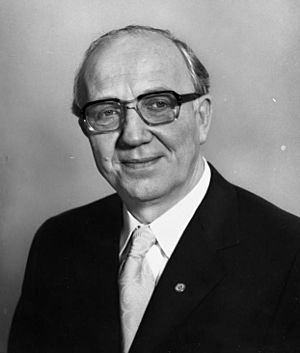Horst Sindermann facts for kids
Quick facts for kids
Horst Sindermann
|
|
|---|---|

Sindermann in October 1973
|
|
| Chairman of the Council of Ministers | |
| In office 3 October 1973 – 29 October 1976 |
|
| President | Willi Stoph |
| Preceded by | Willi Stoph |
| Succeeded by | Willi Stoph |
| President of the Volkskammer | |
| In office 29 October 1976 – 13 November 1989 |
|
| President | Erich Honecker |
| Preceded by | Gerald Götting |
| Succeeded by | Günther Maleuda |
| Deputy Chairman of the State Council | |
| In office 29 October 1976 – 16 November 1989 |
|
| Personal details | |
| Born | 5 September 1915 Dresden, German Empire |
| Died | 20 April 1990 (aged 74) East Berlin, East Germany |
| Political party | KPD (1929–1946) SED (1946–1989) |
| Profession | Politician |
Horst Sindermann (born September 5, 1915 – died April 20, 1990) was an important German politician. He was a leader in East Germany, which was a communist country.
He served as the Prime Minister of East Germany from 1973 to 1976. Later, he became the President of the Volkskammer, which was like the speaker of their parliament. He was the only person from the Socialist Unity Party of Germany to hold this job.
Contents
Early Life and Challenges
Horst Sindermann was born in Dresden, Germany. His father, Karl Sindermann, was also a politician. His older brother, Kurt, was also involved in politics.
In 1929, Horst joined the Communist Youth Federation. This group was for young people who supported communist ideas. By 1932, he was a local leader in Dresden.
When the Nazi regime came to power, they banned many groups. In 1933, Sindermann was arrested for his political activities. He was put in prison for eight months.
He continued his political work after his release. In 1935, he was arrested again. This time, he was held for six years in a jail called Waldheim.
In 1941, he was moved to several concentration camps. These were places where the Nazis held people they considered enemies. He was held in Sachsenhausen, Mauthausen, and Ebensee. American soldiers freed him in 1945.
Political Career in East Germany
After World War II, Sindermann returned to Germany. He joined the Communist Party. In 1946, this party merged with another to form the Socialist Unity Party of Germany (SED). This merger was not voluntary for everyone.
Sindermann worked as a newspaper editor for several years. He then became a party leader in different areas. He had some disagreements with other party leaders. Because of this, he was moved to a different newspaper job in Halle.
From 1954 to 1963, he led the party's information and outreach efforts. In 1958, he became a candidate for the party's main committee, the Central Committee. He became a full member in 1963.
That same year, he became the top party leader in the Halle district. He was also elected to the Volkskammer, East Germany's parliament. In 1967, he joined the Politburo, which was the most powerful group in the party.
Leading East Germany
In 1971, Horst Sindermann became the Deputy Prime Minister of East Germany. Two years later, in 1973, he became the Prime Minister. He took over from Willi Stoph, who became the head of the State Council.
However, his time as Prime Minister was short. In 1976, the party leader, Erich Honecker, thought Sindermann's ideas about the economy were too open. So, Willi Stoph became Prime Minister again.
Sindermann was then given the job of President of the Volkskammer. He also became a deputy chairman of the State Council. This was a less powerful role. Usually, the President of the Volkskammer was from a smaller party. This was to make it seem like East Germany had many different political groups. But Sindermann was from the main Communist party. Even though he held a high-ranking title, he had little real power.
He also spoke at events, like the one remembering the liberation of the Sachsenhausen concentration camp.
Later Years and Retirement
Horst Sindermann stayed in his positions until 1989. This was when a peaceful revolution happened in East Germany. Many people protested, and the government began to change.
In November 1989, Sindermann resigned from all his jobs. The Socialist Unity Party (SED) tried to change its image. They even changed their name to the Party of Democratic Socialism (PDS). In December, they removed Sindermann from the party.
In January 1990, he was briefly held for questioning. However, he was released due to health reasons and no charges were filed. He passed away in April 1990 in East Berlin.
Family
Horst Sindermann's stepson was an actor named Peter Sindermann. His grandson, Eric Sindermann, is a handball player and fashion designer.
See also
 In Spanish: Horst Sindermann para niños
In Spanish: Horst Sindermann para niños
 | Delilah Pierce |
 | Gordon Parks |
 | Augusta Savage |
 | Charles Ethan Porter |

